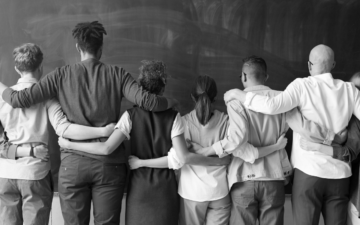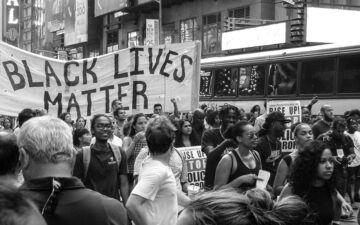On Thursday, June 17, 2021, President Joe Biden signed a bill formally designating June 19 as a federal holiday.
“Juneteenth” and its significance has been recognized by black communities in the U.S. since 1865, but only recently has it turned into a national reckoning. And while acknowledging Juneteenth as a holiday is a step in the right direction, deeper conversations and inclusive actions should take place every single day.
What is Juneteenth?
In 1865, two and a half years after President Abraham Lincoln’s Emancipation Proclamation, U.S. General Gordon Granger stood on Galveston, Texas soil and read General Order Number 3: “The people of Texas are informed that in accordance with a Proclamation from the Executive of the United States, all slaves are free.”
Juneteenth is the oldest nationally celebrated commemoration of the ending of enslaved people in the United States. That day, 250,000 enslaved people were told they were free. A century and a half later, the tradition of Juneteenth continues to resonate in new ways, and Juneteenth shows us that while change is possible, change is also a slow progress that we can all take small steps toward.
Today, Juneteenth celebrates education and achievement. As emphasized in Juneteenth.com, Juneteenth is “a day, a week, and in some areas a month marked with celebrations, guest speakers, picnics and family gatherings. It is a time for reflection and rejoicing. It is a time for assessment, self-improvement and for planning the future. Its growing popularity signifies a level of maturity and dignity in America… In cities across the country, people of all races, nationalities and religions are joining hands to truthfully acknowledge a period in our history that shaped and continues to influence our society today. Sensitized to the conditions and experiences of others, only then can we make significant and lasting improvements in our society.”
Formally recognizing Juneteenth as a national holiday is a step in the right direction, but there is obviously more to be done.
Juneteenth should be held in the same regard and given the same respect and authenticity as other holidays. And Juneteenth is more than just a day off; It’s about recognizing that the systems in today’s society have created a disadvantage for black Americans, and keeping this at the forefront of our minds. On a daily basis, we can recognize the plight faced by black Americans, celebrate all contributions and achievements in unison, and respect and uplift each other — particularly those who have been oppressed.
What can we all do to support the BIPOC (black, indigenous and people of color) community and practice inclusiveness every day?
Even the smallest shifts in our practices, policies and perspectives can change the status quo and lead to more equitable outcomes for marginalized people. And when equitable decisions are made in companies and organizations, it’s important to provide appropriate resources to ensure sustained success beyond your organization’s involvement.
We all have our own perspectives and biases based on where we’re from and who we surround ourselves with. But when you include diversity in everything you do, personally or professionally, we all reap the benefits. This can come in various forms, from holding training and roundtable discussions, to widening your net when posting job openings, to immersing yourself in different groups or opinions. Simply speaking, nothing but good can come from being curious, widening our perspectives and practicing inclusivity in small but powerful ways.
While it’s critical to to proactively engage in conversations, it’s also important to know when to take a step back and listen. Recognizing that we all have things to learn, and taking action to move forward, will be a driving force for change.
Some helpful resources and tools:
Charities and Organizations to Support.
- ACLU. “The ACLU dares to create a more perfect union — beyond one person, party, or side. Our mission is to realize this promise of the United States Constitution for all and expand the reach of its guarantees.”
- NAACP. “We are the home of grassroots activism for civil rights and social justice. We have more than 2,200 units across the nation, powered by well over 2 million activists. In our cities, schools, companies, and courtrooms, we are the legacy of W.E.B. Dubois, Ida B. Wells, Thurgood Marshall, and many other giants of civil rights.”
- NAACP’s Legal Defense and Educational Fund. “Through litigation, advocacy, and public education, LDF seeks structural changes to expand democracy, eliminate disparities, and achieve racial justice in a society that fulfills the promise of equality for all Americans.”
- NBCDI. “The National Black Child Development Institute (NBCDI) has been at the forefront of engaging leaders, policymakers, professionals, and parents around critical and timely issues that directly impact Black children and their families.”
- NOBLE. “Since 1976, The National Organization of Black Law Enforcement Executives (NOBLE) has served as the conscience of law enforcement by being committed to justice by action.”
- BEAM. “BEAM is a national training, movement building and grant making organization dedicated to the healing, wellness and liberation of Black and marginalized communities.”
- SurfearNEGRA. “SurfearNEGRA is a 501c3 organization focused on bringing cultural & gender diversity to the sport of surf. Through strategic partnerships and year round programming, SurfearNEGRA is empowering kids everywhere to #diversifythelineup!”
- Black in Marine Science. “Black In Marine Science started as a week to highlight and amplify Black voices in the field and encourage younger generations, while also shedding light on the lack of diversity in marine science…We created a community of Black marine scientists that was much needed during the isolation caused by the COVID-19 pandemic. After the rewarding turnout of #BlackinMarineScienceWeek we decided it was time to form a non-profit and continue with our goal of highlighting and amplifying Black voices!”
Outside Resources.
- Juneteenth.com. A resource for learning about the history, impact and importance of Juneteenth, including how to celebrate and commemorate.
- The History and Meaning of Juneteenth. A list of educational Juneteenth resources from the NYC Department of Education’s info hub.
- Racial Equity Tools. A library of over 3,000 resources dedicated to educating about the organizational and societal dynamics of racial inclusion and equity.
- #HireBlack. An initiative created with the goal of “helping 10,000 Black women get trained, hired, and promoted.”
- Talking About Race. The National Museum of African American History & Culture’s online portal, featuring exercises, podcasts, videos and other resources for all ages to learn about topics like being anti-racist, providing self care, and the history of race.
Resources from The Ocean Foundation.
- Green 2.0: Drawing Strength from Community with Eddie Love. Program Manager and D.E.I.J. Committee Chair Eddie Love spoke with Green 2.0 about how to use organizational resources to promote equity, and how to not worry about having uncomfortable conversations.
- Standing in Solidarity: A University Call to Action. The Ocean Foundation’s pledge to do more to build an equitable and inclusive movement, and our call to stand in solidarity with the black community — as there is no place or room for hatred or bigotry across our ocean community.
- Real and Raw Reflections: Personal Experiences with D.E.I.J. To encourage normalizing D.E.I.J. conversations across the environmental sector, Program Manager and D.E.I.J. Committee Chair Eddie Love interviewed and invited a number of powerful individuals in the sector to share the challenges they’ve faced, current issues they’ve experienced, and offer words of inspiration for others who identify with them.
- Our Diversity, Equity, Justice and Inclusion Page. Diversity, equity, inclusion and justice are key organizational values at The Ocean Foundation, whether related to the ocean and the climate or to us as humans and colleagues. As scientists, marine conservationists, educators, communicators and people, it is our job to remember that the ocean serves everyone — and that not all solutions look the same everywhere.







